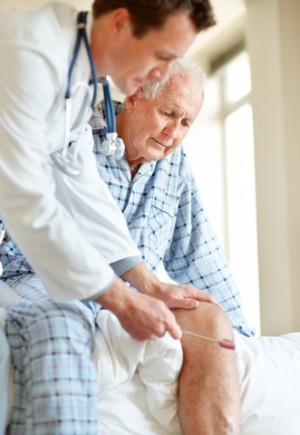Modes of presentation
Bradykinesia
- Sequential reduction amplitude and frequency
- Slowing down, difficulty turning in bed, getting out of the bath
Tremor
- Coarse, often initially unilateral / asymmetrical
- 4-6 Hz- pill rolling
- Differential diagnosis: essential tremor, vascular tremor
Rigidity
- Cog wheeling
- Stiffness
- May be attributed to frozen shoulder etc.
- Muscle aches / pains
Combination features
- Festinant gait
There are non motor symptoms which are increasingly being recognised as part of the symptoms of PD. These are broken into three categories;
1. Cognitive & psychiatric
Depression (40%) - SSRI is first line (but rare interactions with selegeline/ rasegiline) also consider tricyclic antidepressants if the sleep pattern is disturbed. Nortriptyline has the lowest anticholinergic effects and so may have the fewest side-effects.
Psychosis - This may relate to medication- so avoid typical antipsychotics which can worsen the motor symptoms. Atypicals such as quetiapine and olanzapine can be tried.
Anxiety (20-40%)
Dementia – Can occur in late stages but drug side effects can cause similar problems. Sequentially withdraw tricyclics, anticholinergics, selegeline, dopamine agonists. Consider cholinesterase inhibitors- eg; Rivastigmine.
Apathy - SSRIs can help, but not with selegilne
Sleep disorders
- Up to 98% of patients with Parkinson’s
- Wake sleep cycle disrupted
- Nocturia
- Difficulty turning over in bed
- Restless Legs Syndrome (RLS)
- Insomnia
- REM behavioural sleep disorder (RBSD)
- Sleep attacks
- Excessive daytime sleepiness
Sexual dysfunction
2. Dysautonomia
Urinary problems
Constipation (50 %)
Sweating excessively is typical and often associated with dyskinesias.
Orthostatic hypotension (48% of patients with PD) can treat with domperidone (10 mg tds) and/or Fludrocortisone-0.1 mg od.
Hot / cold sensation
Dysphagia/ drooling/ hypernasal speech as a result of the decreased ability of the soft palate to seal off the nasal cavity.
Nausea / weight loss
Anorectal Dysfunction
3. Pain and sensory
Olfactory loss
Pain - This can occur in up to 50 % of patients with PD. Patients may complain of sensory type pain or musculoskeletal pain secondary to parkinsonian rigidity or hypokinesia.
Paraesthesia


